|
|
|
Sort Order |
|
|
|
Items / Page
|
|
|
|
|
|
|
| Srl | Item |
| 1 |
ID:
131415
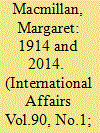

|
|
|
|
|
| Publication |
2014.
|
| Summary/Abstract |
The outbreak of the First World War remains a great historical puzzle and a source of concern, for if we do not understand how it came about we run the risk of stumbling into a similar catastrophe. This article draws parallels between the world of 1914 and the present. It starts with comfortable assumptions made by so many, then and now, that a major conflict was impossible or improbable and then looks at the paradox that globalization not only made the world more interdependent and linked, but also fostered intense local and national identities. It suggests factors that propelled Europe to war in 1914, including national rivalries, imperialism, the arms race and a shifting power balance between rising and declining powers, as well as ideologies and assumptions such as Social Darwinism and militarism, and points out that similar forces and ideas are present today. The article also stresses the dangerous complacency that can arise as a result of decision-makers having successfully dealt with a series of crises. European decision-makers also assumed that they could successfully use war as an instrument of policy and largely ignored or explained away the mounting evidence that the advantage in conflict was swinging to the defence. Again, as the author points out, there are disquieting parallels with the present.
|
|
|
|
|
|
|
|
|
|
|
|
|
|
|
|
| 2 |
ID:
119766
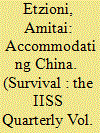

|
|
|
| 3 |
ID:
120541
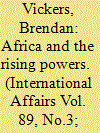

|
|
|
|
|
| Publication |
2013.
|
| Summary/Abstract |
With abundant resources and growing markets, the African continent is once again at the centre of a new 'great game of courtship' between the established and rising powers. However, compared with previous decades, African countries are no longer passive players in international relations.
This article explores Africa's recent negotiating behaviour in relation to a selected set of actors that animate the current shifting global economic order: rising powers, established powers and international organizations. Despite potential sources of bargaining leverage, most African countries (with some notable exceptions) are still reactive to the bilateral overtures of Brazil, China and India and unable to set the terms of engagement.
Nonetheless, the rise of these new powers provides alternative negotiating partners (and potentially more developmental outcomes) to the established powers. By comparison, at the multilateral level the African Group has been far more active and assertive in contesting global governance in the pursuit of greater distributive justice, particularly in the climate, trade and security regimes. This has taken place largely through the adroit use of distributive bargaining and tactics, supplemented by normative-based strategies highlighting Africa's underdevelopment.
The central argument of the article is that African countries require judicious negotiating strategies, improved deliberative capacities and coalitions with local/continental/global civil society and business networks in order to ameliorate their weaker bargaining power and reshape the terms of their engagement with their international partners, particularly the rising powers.
|
|
|
|
|
|
|
|
|
|
|
|
|
|
|
|
| 4 |
ID:
133777
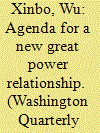

|
|
|
|
|
| Publication |
2014.
|
| Summary/Abstract |
Well begun is half done," Aristotle once said, meaning that beginning a project well makes it easier to do the rest. Yet, this may not be true of China-U.S. relations during Obama's presidency. Although the Obama administration secured a smooth transition from the George W. Bush years and attached high priority to relations with China during its first year in office, bilateral relations turned downward over the rest of Obama's first term, leaving a legacy of growing mutual suspicion and rising competition between the two countries, especially in the Asia-Pacific region. In spite of the November 2009 bilateral agreement to build a "positive, cooperative, and comprehensive relationship,"1 the two sides missed opportunities for more cooperation while mishandling and even misguiding bilateral ties on some points.
|
|
|
|
|
|
|
|
|
|
|
|
|
|
|
|
| 5 |
ID:
132781
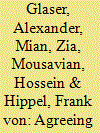

|
|
|
|
|
| Publication |
2014.
|
| Summary/Abstract |
Iran is negotiating with a group of six states over the future of its nuclear program. In November 2013, Iran and the P5+1 (China, France, Germany, Russia, the United Kingdom, and the United States) agreed to a Joint Plan of Action that seeks to reach a "comprehensive solution" by July 20, 2014.
The goal is an agreement on a set of measures that can provide reasonable assurance that Iran's nuclear program will be used only for peaceful purposes and enable the lifting of international sanctions imposed on Iran over the past decade because of proliferation concerns.
A key challenge is to reach agreement on limiting Iran's uranium-enrichment program, which is based on gas centrifuges, in a way that would enable Iran to meet what it sees as its future needs for low-enriched uranium (LEU) fuel for nuclear research and power reactors while forestalling the possibility that this program could be adapted to quickly produce highly enriched uranium at levels and in amounts suitable for use in nuclear weapons
|
|
|
|
|
|
|
|
|
|
|
|
|
|
|
|
| 6 |
ID:
132005
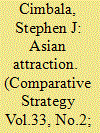

|
|
|
|
|
| Publication |
2014.
|
| Summary/Abstract |
The United States' military-strategic pivot toward Asia is motived by concerns about a rising China, about the increased significance of Asia on the world economic and political stages, and about the growing risks of nuclear proliferation and nuclear first use in that region. Nuclear Asia already numbers five acknowledged or de facto nuclear weapons states among its members: Russia, China, North Korea, India, and Pakistan. Failure to reverse North Korea's nuclear weapons status or political distrust among other powers may increase the number of Asian nuclear weapons states (including states with prospective nuclear-missile reach into Asia) to eight, creating an Asian-Middle Eastern nuclear arms race that defies containment. On the other hand, an alternative presents itself, in the form of a multilateral nuclear arms reduction agreement that would create three tiers of accepted nuclear weapons states and bar the door to new admits.
|
|
|
|
|
|
|
|
|
|
|
|
|
|
|
|
| 7 |
ID:
130170


|
|
|
|
|
| Publication |
2014.
|
| Summary/Abstract |
Asia's middle powers face a trilateral dilemma stemming from their relationships with the U.S. and China. This paper uses the Australian example to examine the dilemma. It shows that Australia has bound itself to the U.S. because of domestic political factors, cost considerations, a belief that it can keep its interests separate, and its perception of regional threats. The paper then argues that others are likely to resolve their trilateral dilemmas in ways that make the regional strategic dynamic more competitive.
|
|
|
|
|
|
|
|
|
|
|
|
|
|
|
|
| 8 |
ID:
130176
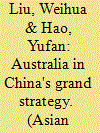

|
|
|
|
|
| Publication |
2014.
|
| Summary/Abstract |
This paper examines China's strategic interests in Australia. From the security per- spective, Beijing hopes that Australia will be a constructive factor for its peaceful rise. On the economic side, Beijing hopes that the bilateral relationship will ensure sufficient and sustainable resources and energy supplies from Australia for China's domestic needs
|
|
|
|
|
|
|
|
|
|
|
|
|
|
|
|
| 9 |
ID:
130174


|
|
|
|
|
| Publication |
2014.
|
| Summary/Abstract |
In responding to China's rise, the best strategy for Australia involves a combination of accommodation and ''soft balancing.'' The viability of this strategy is related to the extent to which U.S.-China relations are cooperative or conflictual. Recent Australian governments have been successful in implementing this preferred strategy.
|
|
|
|
|
|
|
|
|
|
|
|
|
|
|
|
| 10 |
ID:
121408
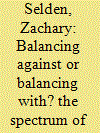

|
|
|
|
|
| Publication |
2013.
|
| Summary/Abstract |
During the 2001-2009 period when American foreign policy was internationally unpopular and perceived as unilateral, many states strengthened their security cooperation with the United States and facilitated the reach of the us military. This behavior spans a range of actions along a spectrum from reaffirming traditional alliances to far more subtle forms of alignment. This pattern is in large part driven by the actions of regional powers such as Russia and China whose rising power pushes neighboring states to seek the assurance of the United States, and it has distinct implications for the endurance of American hegemony. As those regional powers seek to expand their influence, secondary states may increase their contributions to the maintenance of American hegemony, thus helping to extend it well into the future. They are less prone to do so, however, if the United States follows a strategy of restraint that calls into question its willingness to defend its hegemony. Therefore, a policy focused on maintaining American military preeminence and the demonstrated willingness to use it may be what sustains the cooperation from second-tier states that helps to maintain American hegemony.
|
|
|
|
|
|
|
|
|
|
|
|
|
|
|
|
| 11 |
ID:
131995


|
|
|
|
|
| Publication |
2014.
|
| Summary/Abstract |
Within the scholarly debate on the current power transition in the international system, particular importance is attached to China's economic rise and the global shifts it is bringing forth in material primacy. A thorough understanding of these shifts in the relative distribution of power, however, requires leaving the narrow path of material capabilities and looking at normative accounts as well. Taking up this challenge, the article focuses on the political dimension of China's rise by exploring the country's alignment with South American governments along two dimensions: the convergence of their foreign policy ideas and the provision of diplomatic links facilitating their cooperation and coordination in global politics. The empirical analysis depicts a nascent global agenda forming between China and certain South American countries and shows that, along with growing levels of foreign policy compatibility, China has also advanced its diplomatic inroads into the region, particularly at the level of bilateral relations. Taking these developments as a whole, it is suggested that China has gained international attraction in terms of its visions of global order and as a potential political partner throughout the region. The article concludes with a discussion of the findings in light of the ongoing relative shifts in the distribution of global power beyond material primacy, and the prospects for China's further political rise.
|
|
|
|
|
|
|
|
|
|
|
|
|
|
|
|
| 12 |
ID:
130610
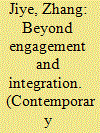

|
|
|
|
|
| Publication |
2014.
|
| Summary/Abstract |
As part of its new strategy of "retuming to the Asia-Pacific region", the A Obama administration has adopted some tough economic policies towards China, notably promoting the Trans-Paci?c Partnership (TPP) and attempting to establish new rules of international trade and investment aimed at strengthening economic ties with other Western countries through the Trans-Atlantic Trade and Investment Partnership Agreement(TTlP ), both of which tend to compress the geopolitical space for China's economic rise. The administration is also using a 'green barrier' to suppress the development of China's high-tech industry, and using economic diplomacy and investment restrictions against Chinese state-owned enterprises. This paper seeks to examine and analyze the causes of shifts in the U .S. economic strategy towards China.
|
|
|
|
|
|
|
|
|
|
|
|
|
|
|
|
| 13 |
ID:
120540
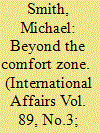

|
|
|
|
|
| Publication |
2013.
|
| Summary/Abstract |
This article explores the extent to which the European Union (EU) has responded effectively to the rising powers of Asia, Latin America and Africa, and whether the Union has been able to construct an effective diplomacy for dealing with them.
It starts from the observation that the EU has significantly developed its diplomatic apparatus since the Lisbon Treaty, and that this apparatus is largely directed towards the establishment of negotiated order at the regional and global levels. The article identifies a number of tensions and contradictions that arise from the EU's status and role in the global arena and that feed into its quest for negotiated order.
It goes on to assess the challenges to EU positions and strategies that arise not only from the emergence of new powers in the world arena, but also from the changes in global structures and processes that accompany this development.
The article then investigates how these challenges have interacted with the search for negotiated order in a series of issue areas: security, commercial policy, development, environment and energy. It argues that in recent years the EU has, in a variety of ways, been taken outside its comfort zone and that while the European Union can and must seek to re-establish negotiated order in its external relations, the challenge of doing so is severe.
|
|
|
|
|
|
|
|
|
|
|
|
|
|
|
|
| 14 |
ID:
126675
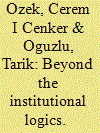

|
|
|
|
|
| Publication |
2013.
|
| Summary/Abstract |
This article aims to explain the slowing down of European Union (EU)-Turkish relations since the start of the accession negotiations in 2005 with international level systemic analysis. For this purpose, it examines the current challenges the new rising powers pose to the US-led unipolar international order and it shows how both the EU's and Turkey's responses to these challenges influence their relative powers as well as the negotiation process. By focusing on international level systemic dynamics, the article differs from the institutional explanations that explain EU-Turkish relations either with the utility-based logic of consequentialism or the norms-based logic of appropriateness.
|
|
|
|
|
|
|
|
|
|
|
|
|
|
|
|
| 15 |
ID:
131446
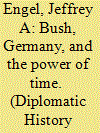

|
|
|
|
|
| Publication |
2013.
|
| Summary/Abstract |
George H.W. Bush backed German reunification with a puzzling degree of enthusiasm. His strategic reasoning was clear and not in dispute, as he desired to keep a unified Germany enmeshed within NATO. Less obvious, however, is his general forgiveness of Germany's past, for which he was pilloried. Yet history was much on Bush's mind in reaching these decisions. Germans had learned from the past, he argued. Europeans had not. They could not keep the peace no matter their ongoing political consolidation, his administration concluded by reading European history, without Americans in their midst. Bush backed unification, therefore, to ensure NATO's survival and thus an ongoing American presence on the continent. By studying Bush's sense of history, and a policymaker's historical sensibility more broadly, historians can thus gain greater insight into this decision and how strategic decisions are more generally formed
|
|
|
|
|
|
|
|
|
|
|
|
|
|
|
|
| 16 |
ID:
131416
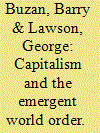

|
|
|
|
|
| Publication |
2014.
|
| Summary/Abstract |
The two-centuries-old hegemony of the West is coming to an end. The 'revolutions of modernity' that fuelled the rise of the West are now accessible to all states. As a consequence, the power gap that developed during the nineteenth century and which served as the foundation for a core-periphery international order is closing. The result is a shift from a world of 'centred globalism' to one of 'decentred globalism'. At the same time, as power is becoming more diffuse, the degree of ideological difference among the leading powers is shrinking. Indeed, because all Great Powers in the contemporary world are in some form capitalist, the ideological bandwidth of the emerging international order is narrower than it has been for a century. The question is whether this relative ideological homogeneity will generate geo-economic or geopolitical competition among the four main modes of capitalist governance: liberal democratic, social democratic, competitive authoritarian and state bureaucratic. This article assesses the strengths and weaknesses of these four modes of capitalist governance, and probes the main contours of inter-capitalist competition. Will the political differences between democratic and authoritarian capitalists override their shared interests or be mediated by them? Will there be conflicting capitalisms as there were in the early part of the twentieth century? Or will the contemporary world see the development of some kind of concert of capitalist powers? A world of politically differentiated capitalisms is likely to be with us for some time. As such, a central task facing policy-makers is to ensure that geo-economic competition takes place without generating geopolitical conflict.
|
|
|
|
|
|
|
|
|
|
|
|
|
|
|
|
| 17 |
ID:
131999
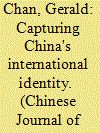

|
|
|
|
|
| Publication |
2014.
|
| Summary/Abstract |
What is China's international identity? How has it changed over time, especially since the reform and opening up of the country in the late 1970s? How does China see itself? And how do other countries see China? I argue that answers to these questions are instrumental to a proper understanding of Chinese foreign-policy behaviour, in ways more significant than we normally assume. To advance this argument, I choose to examine China's social interactions with the outside world to ascertain the evolution of its international identity/identities. I shall trace the domestic sources of China's external policies. In so doing, I hope this article will elucidate the 'debates' between social constructivism and realism as to their relative explanatory power with respect to the making of Chinese international identity. I also hope it will throw light on a possible alternative framework, known as social evolution, for studying China's international relations and its evolving identities.
|
|
|
|
|
|
|
|
|
|
|
|
|
|
|
|
| 18 |
ID:
167688


|
|
|
|
|
| Summary/Abstract |
This paper challenges dominant understandings of ‘rising powers’ by developing a decentred, relational account of Russia and China in Central Asia. We ask whether Moscow and Beijing’s regional integrative strategies do not guide, but rather are led by, everyday interactions among Russian and Chinese actors, and local actors in Central Asia. Rising powers, as a derivative of ‘Great Powers’, are frequently portrayed as structurally comparable units that concentrate power in their executives, fetishise territorial sovereignty, recruit client states, contest regional hegemony and explicitly oppose the post-1945 international order. In contrast, we demonstrate that the centred discourse of Eurasian integration promoted by Russian and Chinese leaders is decentred by networks of business and political elites, especially with regard to capital accumulation. Adopting Homi K. Bhabha’s notion of mimicry (subversion, hybridity) and J. C. Scott’s conception of mētis (local knowledge, agency), and using examples of Russian and Chinese investments and infrastructure projects in Central Asia, we argue that in order to understand centring discourse we must look to decentring practices at the periphery; that is, rising power is produced through ongoing interactions between actors at the margins of the state’s hegemonic reach.
|
|
|
|
|
|
|
|
|
|
|
|
|
|
|
|
| 19 |
ID:
132554
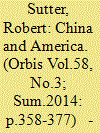

|
|
|
|
|
| Publication |
2014.
|
| Summary/Abstract |
While there have been many sources of tension in U.S.-China relations since the Cold War, they have been held in check generally by circumstances that have inclined the governments to cooperate. Yet, the relationship remains multi-faceted and fragile, and various frameworks and forecasts-like the contemporary "Great Divergence" framework, which speaks to the apparent disjunction between economic and security affairs-have proven to be incomplete and incorrect.
|
|
|
|
|
|
|
|
|
|
|
|
|
|
|
|
| 20 |
ID:
132883
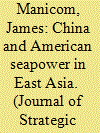

|
|
|
|
|
| Publication |
2014.
|
| Summary/Abstract |
Debates about the future of American seapower in East Asia turn on the argument that American seapower presents a risky and costly luxury that undercuts the cooperative potential of US-China relations. This article asks whether accommodation between China and the United States on the possession and exercise of American seapower in East Asia is possible. Accommodation on this front could significantly lower the risks of unintended escalation and in turn undermine arguments that favour an American retreat from East Asia. The article outlines how accommodation can be achieved on the exercise of American seapower in the region.
|
|
|
|
|
|
|
|
|
|
|
|
|
|
|
|
|
|
|
|
|